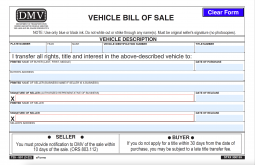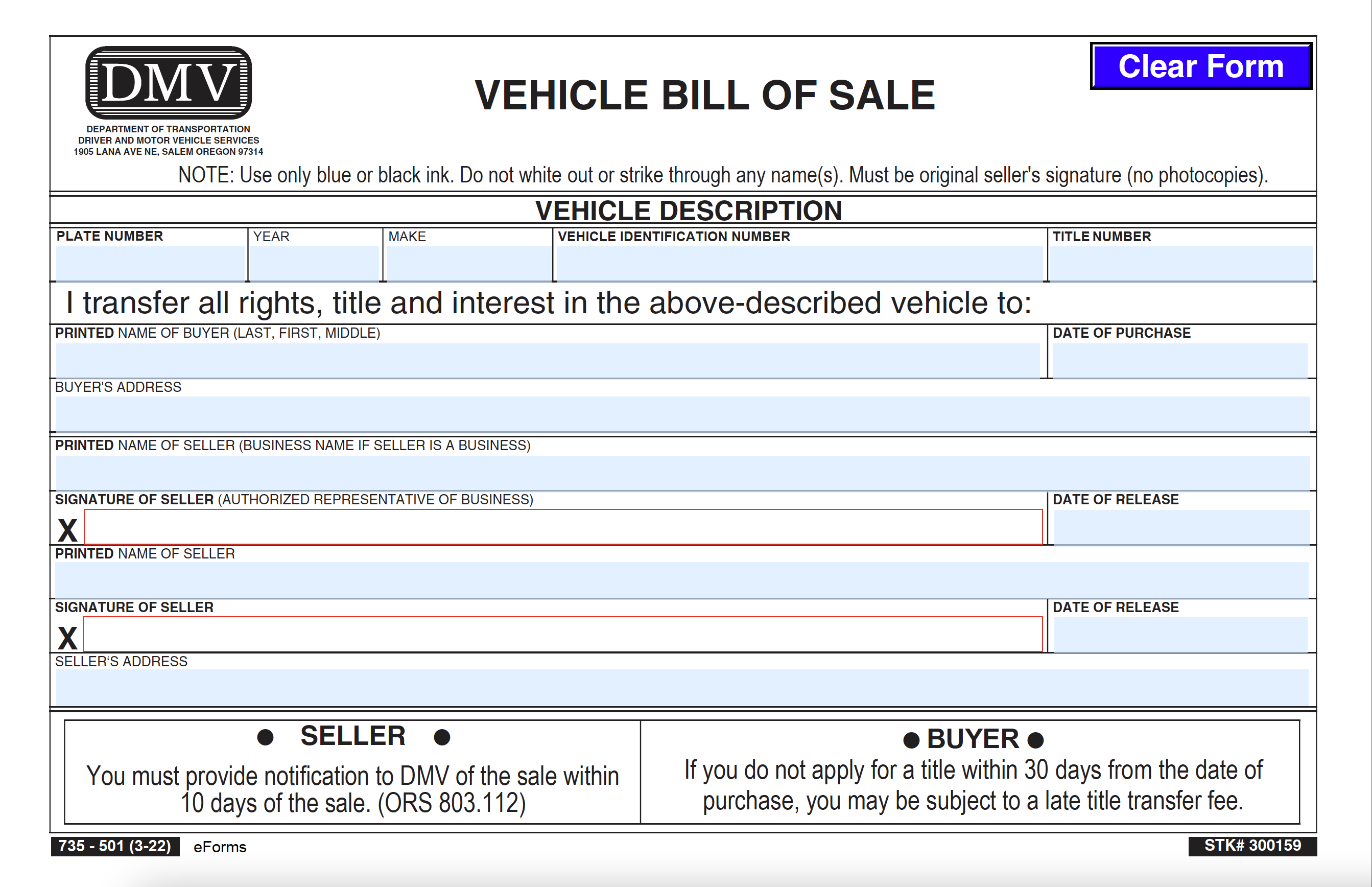Updated September 18, 2023
An Oregon vehicle bill of sale is a legal document that demonstrates that a motor vehicle has legally changed ownership in the State of Oregon. This form will provide information regarding the vehicle, the seller, and the buyer. The seller must contact the DMV to inform them within ten (10) days of the sale of the vehicle, and the buyer must register the vehicle within 30 days of purchase.
Signing Requirements – Both the buyer and the seller are required to sign.
Table of Contents |
Registering a Vehicle
Vehicle buyers must notify the state of a change in Oregon title within thirty (30) days of purchase. If you’ve purchased a vehicle from a dealership in the state the dealership will generally submit all registration documentation for you. If you’re purchasing privately, you will be required to do all submissions yourself. Registration status can last for two or four years, depending on the fee paid and the characteristics of the vehicle. Once registered initially, registration may be renewed online. Be sure to pay the registration fee.[1]
Where to Register
If you must register your vehicle on your own, you must gather all required documentation and appear in person at your local DMV location or submit materials by mail to the Oregon DMV in Salem.[2]
Required Documents
- Application for Title and Registration (Form 735-226)
- A Bill of Sale
- A valid driver’s license
- Payment of all licensing, title and registration fees. Use the state’s fee calculator.
- Proof of compliance with Oregon’s minimum insurance requirements[3]
- For vehicles 10 years old or less, an Odometer Disclosure Statement
- For vehicles with fewer than 7,500 miles and of model year 2009 or newer, proof of compliance with Oregon’s Low Emissions Vehicle Requirement[4]
- Hybrid, electric, and government vehicles are automatically exempted; others that do not meet the requirement must file a Declaration of Exemption
- For vehicles new to Oregon
- Some kind of original ownership document, such as the title from the state where the vehicle is coming from for used cars, or the Manufacturer’s Certificate of Origin for new cars
- Used cars new to Oregon will require a Vehicle Identification Number Inspection that may be scheduled at local DMV Service Center
- Vehicles new to Oregon and belonging to people living in the Portland Metro Area or Rogue Valley Area will need to pass an emissions test conducted by the Department of Environmental Quality to obtain and submit a Certificate of Compliance
- For vehicles obtained outside the United States
- Proof that the vehicle meets federal standards, such as a completed Customs and Border Protection Form 7501
- Proof of foreign lien release with Form 735-6436
- Some kind of original ownership document, such as the title from the state where the vehicle is coming from for used cars, or the Manufacturer’s Certificate of Origin for new cars
- For the transfer of vehicles within Oregon
- The original Oregon title or, if lost, a replacement title
- Bills of sale from previous owners
- For vehicles older than model year 2018, a Certificate of Compliance for passing an emissions test from the Department of Environmental Quality
- For vehicles that are not purchased but bequeathed through an inheritance, proof of the death of the previous owner and information regarding the probate status of the estate.
- If the vehicle was at some point subject to a lien, proof of a lien release on the exchanged title. Unlike other states in which a recorded lien will follow a vehicle, Oregon does not allow the sale or donation of vehicles subject to a lien.[5]
- If an agent is buying the car on the owner’s behalf, a Motor Vehicle Power of Attorney Form.
Sources
- Oregon DMV: Fees
- Oregon Driver & Motor Vehicle Services: Titling and Registering Your Vehicle
- Oregon Driver & Motor Vehicle Services: Minimum Insurance Requirements
- Oregon Driver & Motor Vehicle Services: Low Emissions Vehicles
- Oregon Driver & Motor Vehicle Services: Selling, Donating, or Gifting a Vehicle


